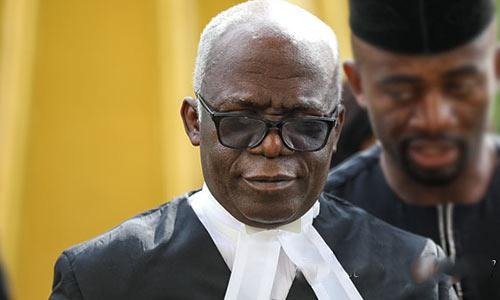Femi Falana Vows to Sue IBB Over Human Rights Violations During Military Rule
 Human rights lawyer, Mr. Femi Falana, SAN, has pledged to take legal action against former Military President General Ibrahim Badamasi Babangida (IBB) for his involvement in numerous violations of fundamental human rights during his time in power.
Human rights lawyer, Mr. Femi Falana, SAN, has pledged to take legal action against former Military President General Ibrahim Badamasi Babangida (IBB) for his involvement in numerous violations of fundamental human rights during his time in power.
Speaking during a national television interview on Politics Today, Falana expressed his intent to challenge the malicious prosecution he and his colleagues faced under IBB’s military regime. He recalled the case of late Major General Mamman Vatsa, who, along with others, was sentenced to death for allegedly plotting a “phantom coup,” calling Vatsa’s execution “a premeditated murder.”
Falana also reflected on the events surrounding the June 12 struggle, where widespread peaceful protests erupted across Nigeria. He explained that it was IBB who ordered the arrest of prominent activists like the late Chief Gani Fawehinmi, Dr. Beko Ransome-Kuti, and himself. The three were detained and brought to Abuja, facing charges of unlawful assembly, conspiracy, and sedition before a Chief Magistrate’s Court.
The sedition charges stemmed from their publication of election results that IBB’s regime had refused to release, which at the time was considered a criminal act. Falana said the military government believed that silencing them and imprisoning them at Kuje Prison would put an end to the protests. However, he pointed out that the regime’s actions only fueled further resistance.
In addition to this, Falana took aim at IBB’s refusal to apologize for the annulment of the June 12 election. He criticized IBB’s failure to take responsibility for the wrongs done to him and his fellow activists, calling it an indication of a lack of accountability. “No apology has been offered for our wrongful arrests and detentions,” Falana said. “So, I am going to sue the General for engaging in massive violations of fundamental human rights.”
Reflecting on the broader political landscape, Falana reminded the public that in 1985, IBB and his colleagues had promised to step down from power in 1990. However, as the years passed, IBB repeatedly postponed his exit, eventually shifting the date to 1993. Falana and other activists organized protests, including the well-known “IBB Must Go” campaign. However, despite their efforts, Falana and his colleagues were imprisoned, denied access to legal counsel, and forced to defend themselves in court.
Falana also revisited the tragic death of journalist Dele Giwa, alleging that IBB’s regime was responsible for Giwa’s murder without justification. He criticized the military junta’s response to the murder and its subsequent cover-up, noting that although there were initial promises for a public inquiry, the government ultimately stifled efforts to bring the perpetrators to justice. Falana described this as part of a broader pattern of impunity that defined IBB’s military regime.
With this legal challenge, Falana seeks to hold IBB accountable for his role in the abuse of human rights during his rule and to seek justice for the victims of the regime’s unlawful actions.













